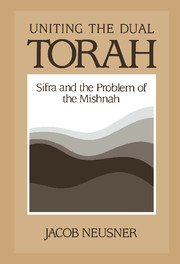Book contents
- Frontmatter
- Contents
- Preface
- Prologue
- 1 The Problem of the Mishnah
- 2 Torah as a Common Noun: The Solution of the Talmuds
- 3 A Sample of Sifra
- 4 From Common Noun to Proper Noun: Sifra's Re-presentation of the Two Torahs as One
- 5 Sifra's Alternative to the Mishnah's Topical Program and Its Order
- 6 Sifra's Alternative to the Mishnah's Logic of Cogent Discourse
- 7 Sifra's Alternative to the Mishnah's Proof of Propositions through Taxonomic Classification and Hierarchization
- 8 Re-presenting the Torah: Sifra's Rehabilitation of Taxonomic Logic
- 9 Torah as Proper Noun and the Structure of the Logic of Creation
- Appendix: The Distinctive Character of Sifra among Midrash Compilations
- Bibliography
- Index
9 - Torah as Proper Noun and the Structure of the Logic of Creation
Published online by Cambridge University Press: 06 July 2010
- Frontmatter
- Contents
- Preface
- Prologue
- 1 The Problem of the Mishnah
- 2 Torah as a Common Noun: The Solution of the Talmuds
- 3 A Sample of Sifra
- 4 From Common Noun to Proper Noun: Sifra's Re-presentation of the Two Torahs as One
- 5 Sifra's Alternative to the Mishnah's Topical Program and Its Order
- 6 Sifra's Alternative to the Mishnah's Logic of Cogent Discourse
- 7 Sifra's Alternative to the Mishnah's Proof of Propositions through Taxonomic Classification and Hierarchization
- 8 Re-presenting the Torah: Sifra's Rehabilitation of Taxonomic Logic
- 9 Torah as Proper Noun and the Structure of the Logic of Creation
- Appendix: The Distinctive Character of Sifra among Midrash Compilations
- Bibliography
- Index
Summary
Sifra's Theology of Revelation
The reader may now wonder whether I have entered a circular argument. When I accounted for Sifra's authorship's critique of the Mishnah's utilization of taxonomic logic for the proof of propositions, I claimed that at stake was not merely omission of proof texts but a (to our authorship) flawed use of a valid logic. Yet I further stressed that the correct utilization of that logic can be shown to occur not only in Sifra but, by Sifra's authorship's own standard, in the Mishnah. I further stipulated that Scripture can have been, and probably was, the source of that appearance in the Mishnah of the kind of polythetic classification of which Sifra's authorship will have approved, if not explicitly, then at least implicitly in the Mishnah's introduction of the same polythetic taxonomy. Therefore, does it not all come down to the presence, or absence, of citations of verses of Scripture? And if all that separates Sifra from Tosefta and the two Talmuds is that the latter suffice with the inclusion of proof texts while the former insists upon rewriting the whole of Scripture in line with the Mishnah, then does not the effort invested in Sifra seem a bit excessive. The result, after all, can have been, and was, accomplished in a much simpler way by the authorships of the successor documents to the Mishnah. Why then the reversion to Scripture in Sifra's rewriting of Scripture, that is, its writing with Scripture?
- Type
- Chapter
- Information
- Uniting the Dual TorahSifra and the Problem of the Mishnah, pp. 182 - 192Publisher: Cambridge University PressPrint publication year: 1990



